Waste collection has always been an essential service for maintaining public health and environmental cleanliness. However, with growing urbanization and increased waste generation, traditional waste collection methods face challenges. Fortunately, modern technology offers solutions that significantly enhance efficiency and effectiveness in waste collection. This article explores how to enhance waste collection with technology and the key advancements shaping the future of this critical service.
1. Why Technology is Essential for Waste Collection
The Growing Challenges of Traditional Waste Collection
As cities expand and populations rise, managing waste becomes increasingly complex. Traditional waste collection systems, which often involve set schedules and manual oversight, can result in inefficiencies such as missed pickups, overflowing bins, and unnecessary fuel consumption. These challenges demand innovative solutions to keep up with modern demands.
By integrating technology, waste collection processes can become more data-driven, allowing for optimized operations, reduced environmental impact, and better service to residents.
Benefits of Technology in Waste Management
Embracing technology in waste collection offers numerous benefits. First, it allows for real-time tracking of waste levels, ensuring timely pickups and preventing overflow. Second, it enhances route planning, saving time and resources by avoiding unnecessary trips. Lastly, technology aids in providing detailed data analysis, enabling waste management companies to improve services continually.

2. Key Technologies Enhancing Waste Collection
Smart Waste Bins with IoT Integration
One of the most significant technological advancements in waste collection is the introduction of smart waste bins equipped with Internet of Things (IoT) sensors. These bins monitor waste levels in real-time and notify waste management teams when they need to be emptied. By using this data, collection routes can be optimized to service only the bins that require attention, leading to fewer trips and reducing both fuel consumption and emissions.
This approach is highly effective in urban areas with high waste production, ensuring timely collection and a cleaner environment.
Route Optimization Software
Another powerful tool for enhancing waste collection is route optimization software. This technology analyzes real-time traffic conditions, waste bin levels, and geographic data to determine the most efficient routes for waste collection trucks. By optimizing these routes, waste management companies can save time, reduce fuel costs, and lower their carbon footprint.
Moreover, this software can be adjusted dynamically, responding to changes such as road closures or unexpected traffic, ensuring waste collection remains smooth and efficient.
3. Waste Management Platforms and Data Analytics
Centralized Waste Management Platforms
Waste management platforms act as centralized systems for managing all aspects of waste collection. These platforms allow for seamless communication between waste collection teams, municipal authorities, and the public. They offer real-time updates on the status of collection services, track waste bin locations, and even allow residents to report issues such as missed pickups or overflowing bins.
This integrated approach leads to better transparency and more responsive waste collection services, improving overall customer satisfaction.
Data Analytics for Continuous Improvement
Incorporating data analytics into waste collection processes is a game-changer for long-term improvement. By collecting and analyzing data on factors like waste generation trends, truck performance, and route efficiency, waste management companies can continuously refine their operations. Data insights help predict peak waste generation periods, identify areas requiring more frequent pickups, and guide resource allocation.
This proactive approach enables waste management teams to stay ahead of potential issues, ensuring a smoother, more efficient collection process.
4. The Role of Artificial Intelligence in Waste Collection
AI-Powered Predictive Models
Artificial Intelligence (AI) is increasingly playing a role in enhancing waste collection by offering predictive models. These models analyze historical data and predict future waste generation patterns. By understanding when and where the most waste will be produced, waste collection teams can proactively plan routes and schedules. This reduces the chances of overflowing bins or unnecessary trips, making the entire system more efficient.
AI is not just about immediate solutions but about creating smarter, more adaptable waste management systems that can evolve with changing conditions.
Conclusion
Incorporating modern technology into waste collection processes is no longer optional; it’s essential for maintaining efficiency and sustainability. By leveraging tools such as IoT sensors, route optimization software, and data analytics, waste management companies can optimize their operations, reduce environmental impact, and improve service quality. Ultimately, understanding how to enhance waste collection with technology leads to cleaner cities and more efficient waste management systems, benefiting both businesses and communities.




